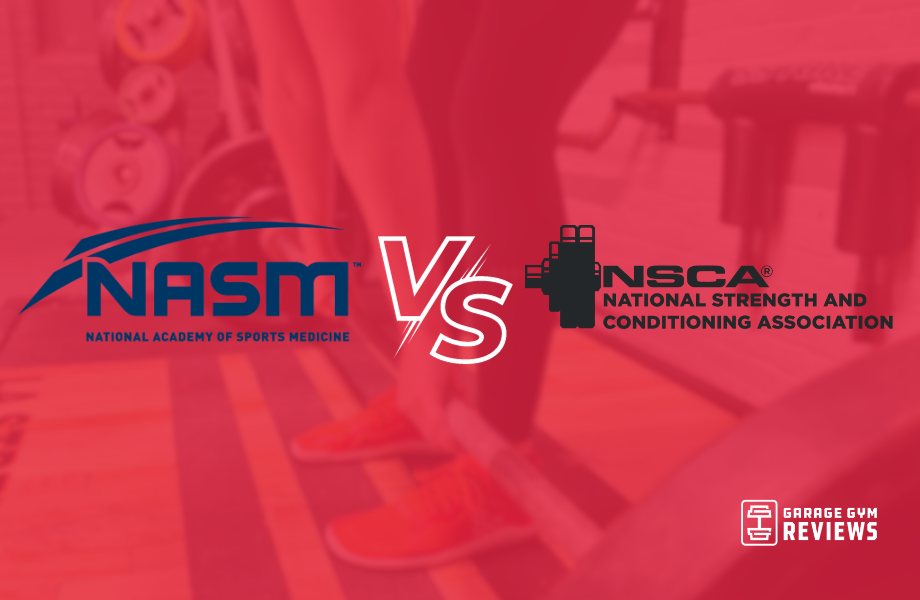We test and review fitness products based on an independent, multi-point methodology. If you use our links to purchase something, we may earn a commission. Read our disclosures.
You’re likely landing on this comparison because you’re wondering how to become a personal trainer. You’ve perhaps even narrowed down your choices to two stellar options within the fitness industry: NASM vs NSCA.
If that’s the case, you’re well on your way to making a choice. I know it’s a hard one to make. I personally wrestled with the NASM (National Academy of Sports Medicine) vs. NSCA (National Strength and Conditioning Association) debate myself about six or so years ago.
I went with NSCA-CPT. I won’t let that cloud my judgment, though. I talked with my Garage Gym Reviews teammates who have earned the NASM certification to hear their perspective, too.
In this comparison, I’ll be walking you through the similarities and differences of NASM and NSCA certified personal trainer (CPT) programs. Both cover in-depth movement assessment, program design, exercise technique, and client behavior.
That said, there are some differences in the learning modules and test-taking experience. Let’s dive in.
NSCA-CPT
NSCA-CPT Certification
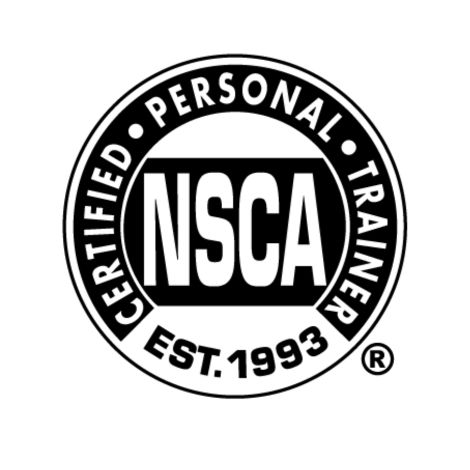
Product Highlights
- Certified personal trainer exam
- NCCA-accredited program
- 155-question exam
- Study materials sold separately
Pros & Cons
Pros
- NCCA-accredited program
- Provides accurate scope of practice
- In-depth approach to 1:1 coaching
- Multiple-choice question exam
Cons
- Study materials are separate from exam fees
- Exam fees are higher for non-NSCA members
- In-person exam only
Bottom Line
The certified personal trainer program from the National Strength and Conditioning Association (NSCA-CPT) offers an in-depth approach to coaching clients for safe and effective fitness programs. You’ll need to be CPR/AED certified to sit for the exam, be 18 years of age or older, and have a high school diploma. The NSCA-CPT exam is taken in-person at a proctored Pearson VUE testing center.
NASM-CPT Course
NASM Personal Training Certification Course
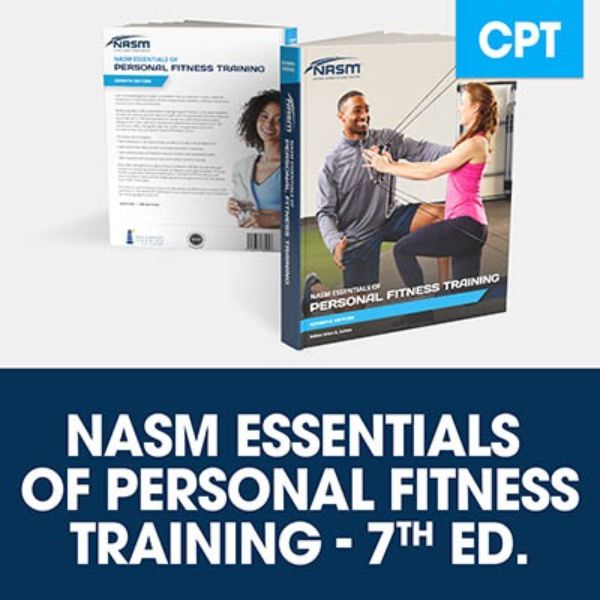
Product Highlights
- Various study packages offered
- New digital learning platform
- The foundation of the course is based on NASM’s Optimum Performance Training Model (OPT) which is a systematic approach to personal training for every type of clien
- Prerequisites – CPR and high school diploma or GED
- Covers behavioral change to assist clients with personal hurdles
- Focus on client assessments to develop plans best suited for each person
Pros & Cons
Pros
- Lots of study materials available: textbook, app, videos, and podcasts
- Built-in opportunities for post-certification internships
- NASM is NCCA-certified
- Discounts often available
- Financing available
- Options for remote or in-person exam
- Other courses available for advanced learning
- Bundle CPT with nutrition and other courses for a discount
Cons
- Higher cost than some other certification programs
- Textbook not included in two most basic packages
- Textbook/online training modules alone may not prepare you well for exam
- Short time frame to take the exam, especially if you work full-time
Bottom Line
NASM’s digital CPT program is a highly reputable and in-depth certification program for anyone looking to become a personal trainer.
NASM vs NSCA Comparison Chart
| NSCA-CPT | NASM-CPT | |
| Prerequisites | High school diploma, 18 years or older, CPR/AED | High school diploma (or GED) and CPR/AED |
| Study options | Self-guided through textbook, practice quizzes and tests, and some live prep courses available | 4 packages: Self-Study, Premium Self-Study, All-Inclusive, and Elite Trainer Bundle |
| Hard copy study materials | Yes | Not included in either Self-Study package |
| Exam pricing | $300 member, $435 non-member (exam only) | Exam and course packages range from $899 to $3,499 |
| Financing options | No | Yes |
| Study materials | Bundle Online Study Course and Essentials of Personal Training ($269 for members, $265 for non-members); Study guide ($20 for members, $27 for non-members) | Access to online learning platform, audio chapter summaries, exercise video library, and test prep mobile app. Hardcopy of the textbook not included in base packages. |
| Practice exam | Quizzes and practice test ($150 for members, $200 for non-members) | Practice exam and quizzes Included in all package options |
| Term length | You have to sit for exam within 120 days of registering | You must take this exam within 180 days of your enrollment date. |
| Exam passing score | 70% | 70% |
| Exam format | 155 multiple choice questions | 2 choices: Either 100 or 120 multiple choice questions |
| Exam option | In-person at Pearson VUE Testing Center | 2 choices: Non-proctored, open-book exam or proctored, closed book |
Quick Look At Two Personal Training Certifications: NASM vs NSCA
The NASM and NSCA programs both grant you CPT certifications once you pass the exam with a 70% score or higher. However, the learning modules and materials it takes to prepare for each exam vary.
Both organizations offer accredited certifications through the National Commission For Certifying Agencies (NCCA). This is important for fitness professionals who want to secure a job at a commercial gym or convey authority in the industry.
RELATED: NASM Certified Nutrition Coach Course Review
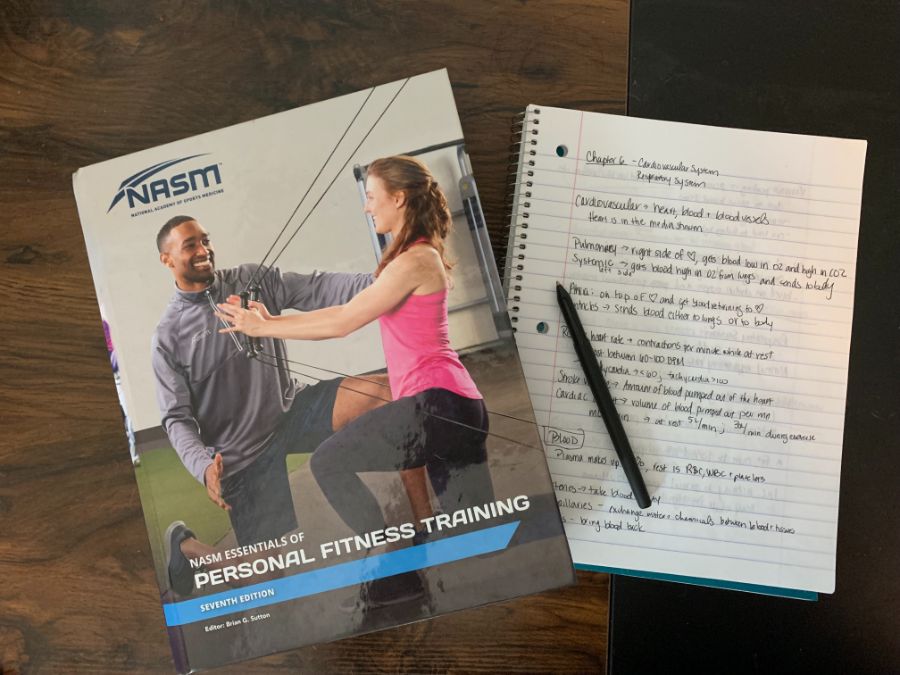
NCCA-accredited programs are often considered the gold standard for fitness certifications. Other NCAA-accredited CPT programs include:
- American Council on Exercise (ACE)
- International Sports Sciences Association (ISSA)
- American College of Sports Medicine (ACSM)
- National Council on Strength and Fitness (NCSF)
RELATED: ACE vs NASM
Who Should Study With NASM
- People who want the ability to earn specialization certs later on
- Individuals who prefer financing options
- Folks who want exam options (proctored exam or non-accredited open book)
- Anyone who needs the accountability of an end date
Who Should Study With NSCA
- People who prefer to purchase study materials and exam separately
- Folks who don’t want to rush the study process
- Anyone who has some experience training clients or athletes

NASM vs NSCA Similarities
- Both are NCCA-accredited certification programs
- Neither require advanced exercise science or kinesiology degrees
- Both require a high school diploma and CPR/AED certification
- Both exams require 70% passing grade in order to receive certification
- Both exams have non-scored questions
NASM vs NSCA Differences
- NASM offers 2 exam options; NSCA only offers in-person proctored exams
- NASM offers package pricing for coursework, online training, and the final exam
- NSCA is more of an a la carte store and self-study program, no financing options
NASM vs NSCA Costs
There are four tiers to the NASM program. You can buy the most basic package for $899 which is a totally online course that includes a digital learning platform, high-end learning videos, audio chapter summaries, exercise demonstration library, biodigital 3D models
handouts and resources library, practice exam, and access to a test prep mobile app.
With each tier there are added benefits and the top two options also include a hardcopy textbook. All NASM CPT below options come with two exam options, which I’ll dive into a bit later.
- Self-Study: $899
- Premium Self-Study: $1,399
- All-Inclusive: $1,899
- Elite Trainer Bundle: $3,499
With the NSCA you’ll have a la carte purchasing options for everything from the exam to the study materials and practice test. I personally found this method helpful—at the time I was working as an apprentice at a gym, making very little money. I rented the textbook on Amazon for around $50 for a six month period, purchased the study guide, downloaded the detailed content outline (DCO), and got to work reading and studying.
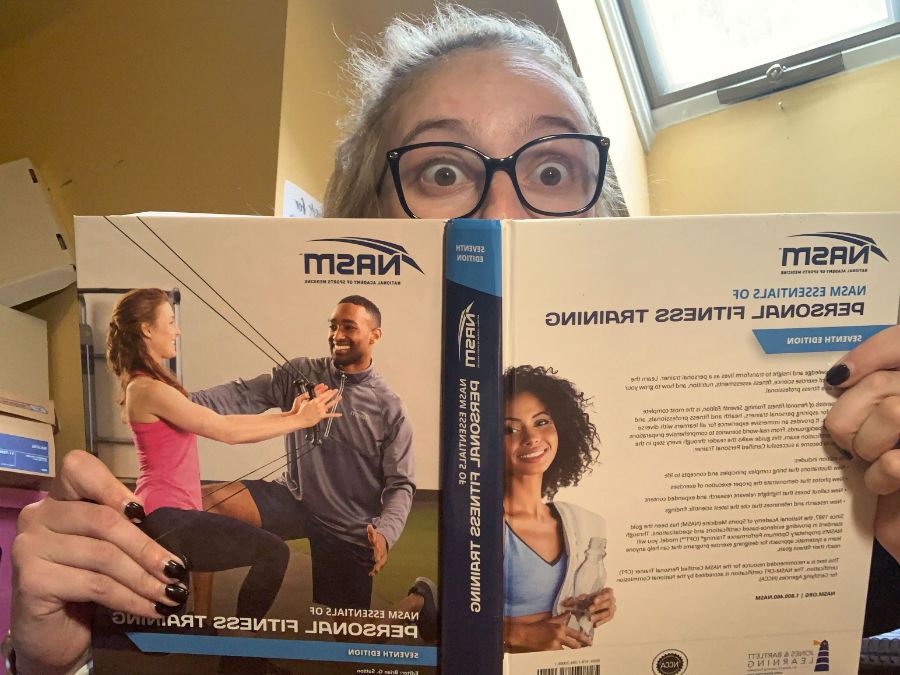
I opted out of the online study course and leaned heavily on the mentors I met through my apprenticeship. While that may have worked for me, consider the fact I was getting hands-on experience during my studies. That course of action won’t work for everyone.
It’s also worth noting that if you decide that you’ll benefit from the online study course, the only way you can purchase it is if you buy the bundle, which includes the textbook and online prep course.
Here’s a cost breakdown of what’s available directly on the NSCA store:
- NSCA membership (optional): $130 annually
- NSCA-CPT exam: $300 ($435 for non-members)
- Study guide: $20 for members ($27 for non-members)
- Quizzes and practice test: $150 for members ($200 for non-members)
- Exercise Technique Manual for Resistance Training, 4th Edition: $80 for members ($89 for non-members)
- Essentials of Personal Training, 3rd Edition: $119 for members, $109 for non-members)
- Bundle: Online Study Course and Essentials of Personal Training book: $269 for members ($265 for non-members
I also opted not to buy the practice exam, which I do not recommend. It’s well worth the investment. The wording on test questions can be tricky, especially when asked about contraindications.
NASM vs NSCA: Prerequisites
Both NASM and NSCA require you to have a high school degree and be 18 years of age or older. NASM also notes you can have your GED and the NSCA notes high school degree or equivalent.
Both organizations also require a CPR and AED certification. NASM requires the CPR/AED cert before the exam and the NSCA allows it to be taken up to one year after the certification exam.
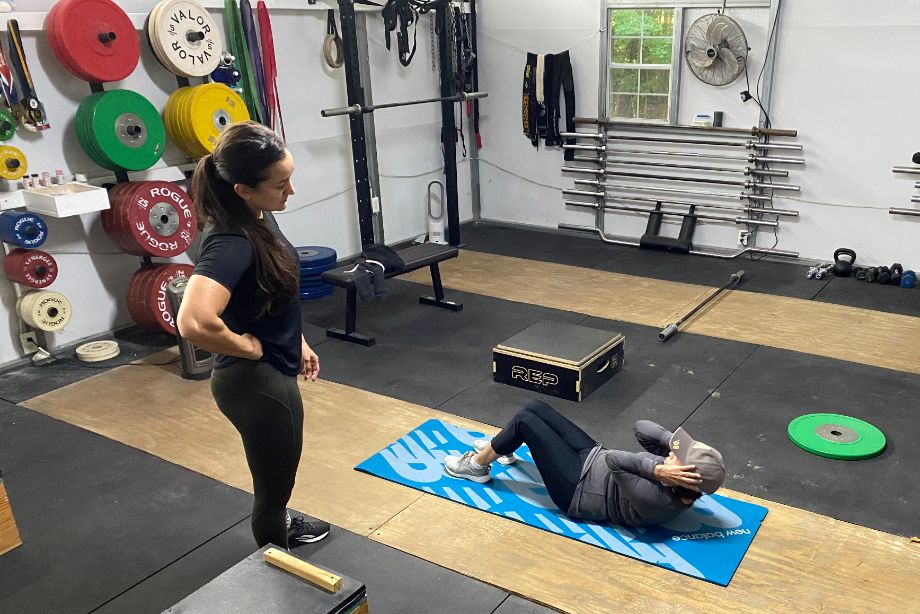
NASM vs NSCA: Exams
Test-takers for the NASM exam have two options, but either way you’ll need a 70% or higher to pass. According to an updated report from NASM, the pass rate is 79% for the proctored exam and 90% for the non-proctored exam. Here are the two test options:
- NASM Personal Trainer Certificate: This is a non-proctored, open-book exam. It has 100 exam questions. You’ll be given three attempts to pass your exam.
- NASM Certified Personal Trainer: This option is a closed-book, NCCA-accredited certification exam. It’s proctored (in-person or online), takes 2 hours, with 120 multiple choice questions.
Kate Meier, NASM-CPT, USW-L1, and GGR head of content writes in her NASM review, that you won’t have to study too far beyond the basics in nutrition. The example she uses is being able to determine which types of vitamins are fat-soluble.
RELATED: Best Turmeric Supplement

She also notes it’s important to know your exercise assessments. Be sure you understand movement flaws and what that could mean for your client in terms of overactive and underactive muscles.
Kate also notes that getting familiar with a few key terms and root words was helpful for reading and answering test questions. She says terms like broncho, osteo, and -ectasis came up quite a few times.
The NSCA-CPT exam also requires a 70% grade to pass the exam. It has 155 multiple choice questions and you can take up to 3 hours. According to the NSCA, the pass rate in 2022 was 66% for first-time candidates attempting the CPT exam.
The NSCA updates and revises exams nearly every two years, but at the time I wrote this comparison this is how the categories are broken down:
- 32 client assessment and evaluation
- 45 program planning
- 43 exercise technique
- 20 safety, emergencies, and legal procedures
- 15 non-scored questions
You can use the detailed content outline (DCO) to help you prepare and study for the above categories, which is exactly what I did.
It’s worth noting that I experienced several questions with a bit of math—which can be intimidating if you’re more skilled with the arts and languages, like me.
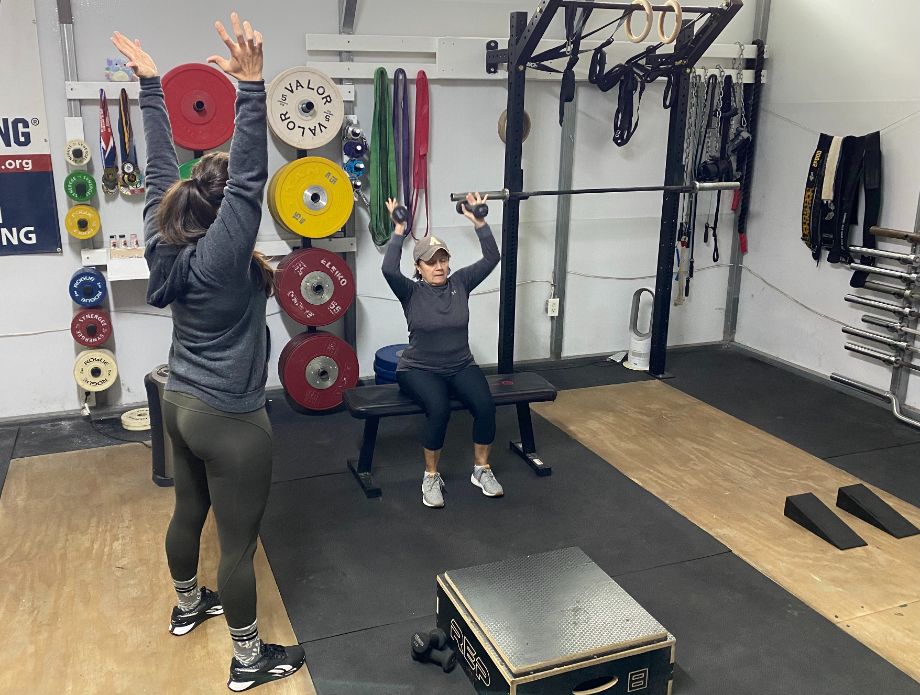
For example, there were questions on how to calculate a client’s one rep max (or three rep max) based on some of the information provided about a client training with submaximal weights (or vice versa).
There were also questions related to target heart rate and blood pressure, which are simple formulas and doable to recall, but you will need to memorize them because it’s likely they’ll show up in the fitness evaluation category.
I also remember several questions where I needed to recall calories per macronutrient to figure out how many calories a client was intaking per day.
RELATED: What Should My Macros Be?
Although that may seem like outside the scope of practice for a CPT, on the DCO one line item states that you’ll need to effectively communicate and educate using information from peer reviewed resources regarding general nutrition, supplements, nutrient timing, hydration, and daily caloric needs.
NASM vs NSCA: Recertification
NASM and NSCA both have a two-year recertification cycle. That means you’ll be required to stay up-to-date with the fitness industry with continuing education in order to keep your credentials.
For NASM, it will be required to earn 2.0 NASM-approved CEU credits every two-year period. And for NSCA, you’ll need 6.0 CEU credits every reporting cycle.
Each organization scores CEUs a bit differently, but you can expect that things like attending seminars (in-person or online), passing quizzes, watching education videos, publishing articles, and completing coursework can earn you CEUs. If you’re not utilizing credits directly through the NASM or NSCA, both organizations require materials to be approved to be considered for CEUs.
Additional Programs and Offerings
Both organizations offer more than just CPT certifications. Here is a look at what else you can prepare for and get certified in (or use toward your CEUs):
Other certs offered by NSCA:
- Certified Strength and Conditioning Specialist (CSCS)
- Certified Performance and Sport Scientist (CPSS)
- Tactical Strength and Conditioning Facilitator (TSAC-F)
- Certified Special Population Specialist (CSPS)
Other certs offered by NASM:
- Certified Nutrition Coach (NASM-CNC)
- Certified Wellness Coach (NASM-CWC)
- Performance Enhancement Specialist (NASM-PES)
- Corrective Exercise (NASM-CES)
- Home Gym Design (NASM-HGD)
- Corrective Exercise Specialist (NASM-CES)
Additionally, NASM offers tons of specialization courses including virtual coaching, senior fitness, youth fitness, and group fitness instructor to name a few.
NASM vs NSCA: Final Thoughts
When it comes to the NASM vs NSCA debate, there is no doubt it’s a difficult decision. Both offer NCCA-accredited programs and exams that can get your foot in the door training clients at commercial gyms.
Both the NASM and NSCA certifications and study materials will prepare you to assess new clients, evaluate imbalances, and create programs for performance training, resistance training, or cardiovascular exercise.
While training athletes is possible if you have your CPT, both certification organizations offer advanced degrees that are specific to athletes and team sports and dive deeper into biomechanics and physiology.
The biggest difference is the coursework and study methods. The NSCA has mostly self-study options while NASM offers multiple tiers of self-study and guided methods.
Here are some things to keep in mind:
- Pricing for the NASM certification is in four tiers running from $899 to over $3,000. This includes coursework and the exam costs. Each package includes additional features.
- NASM offers two methods to take your final exam: A proctored NCCA-accredited option and an open-book, non-accredited exam.
- The NSCA only offers in-person proctored exams in a Pearson VUE testing center.
- The exam cost for the NSCA-CPT is separate from any coursework or study materials. You will have to buy each item separately.
NASM vs NSCA: FAQs
What is the difference between NASM and NSCA CSCS?
The NASM certified personal trainer program and exam cover the essentials of personal training and working with general population clients.
The NSCA CSCS certification is designed to prepare strength coaches to design training programs for athletes and sports teams to improve athletic performance.
What certifications do most gyms accept?
If you’re looking to get hired as a personal trainer, commercial gyms recognize and accept certifications from NASM, NSCA, ACSM, ISSA, NESTA, and NSCF (among others).
What is the cost of NSCA?
Membership fees for the NSCA are $130 annually and the NSCA-CPT exam is $300 ($435 for non-members). The following exam study materials can be purchased individually:
-Study guide ($20 for members, $27 for non-members)
-Quizzes and practice test ($150 for members, $200 for non-members)
-Exercise Technique Manual for Resistance Training, 4th Edition ($80 for members, $89 for non-members)
-Essentials of Personal Training, 3rd Edition ($119 for members, $109 for non-members)
-Bundle: Online Study Course and Essentials of Personal Training ($269 for members, $265 for non-members)
Does NSCA require a degree?
The NSCA-CPT certification program requires a high school diploma. The CSCS and the CPSS certifications from the NSCA require a bachelor’s degree and a Bachelor’s of Science in sport science or closely related field, respectively.
Further reading

We go over the performance, specs, and workout experience of this all-new machine in our NordicTrack T Series 10 treadmill review. Read more

The Kabuki Strength Duffalo Baris a new take on an old specialty bar, the Buffalo Bar. After using the Duffalo Bar over two years and hundreds of workouts, we believe the Duffalo Bar is one of the best specialty bars currently available. Read more

Weightlifting shoes can be pricey, but how does this budget shoe compare? Learn more in this Reebok Lifter PR 3 review. Read more

You’re likely landing on this comparison because you’re wondering how to become a personal trainer. You’ve perhaps even narrowed down your choices to two stellar options within the fitness industry: NASM vs NSCA. If that’s the case, you’re well on your way to making a choice. I know it’s a hard one to make. I personally wrestled with the NASM (National Academy of Sports Medicine) vs. NSCA (National Strength and Conditioning Association) debate myself about six or so years ago. » Read more about: How to Decide on the Best Personal Trainer Certification: NASM vs NSCA (2025) » Read more

